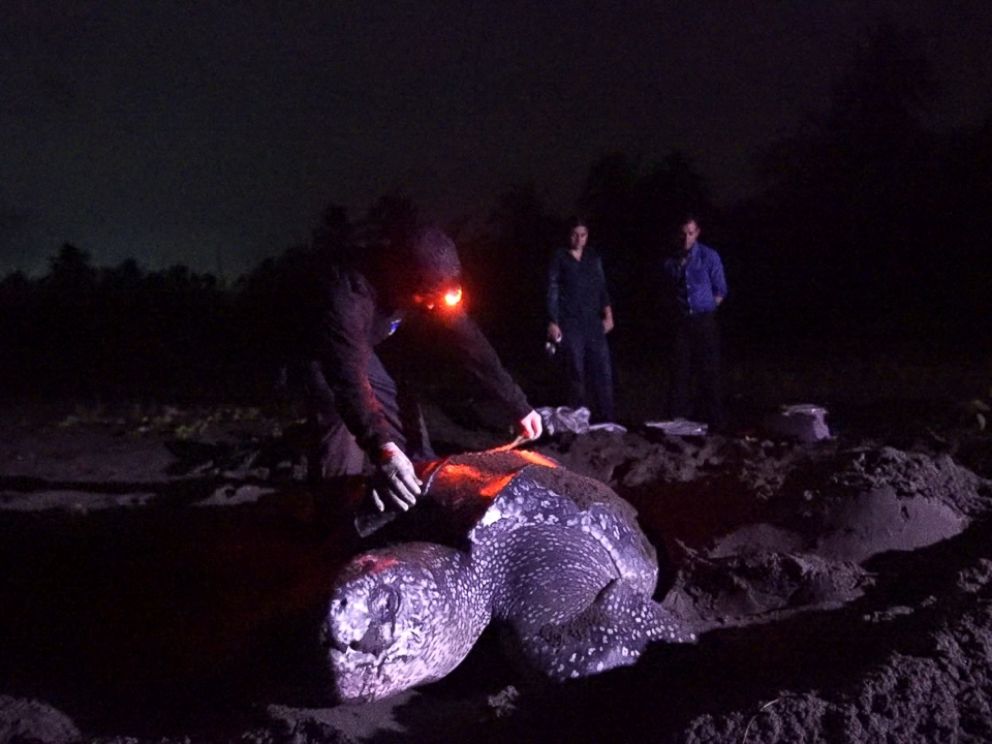Moin Beach in Costa Rica has long served as nesting grounds for leatherback turtles, but it is also one of the most dangerous beaches in Central America.
Weighing in at up to 2,000 pounds, leatherback turtles are the largest turtles on earth, and these prehistoric giants have been coming to the shores of this remote beach to make their nests since before humans walked the Earth. One turtle can lay up to 100 eggs at a time during nesting season from March to July.
But the beach is in an area of the country far away from the tourist zone, making it a haven for both narco-crime and poachers looking to make a profit.

Weighing in at up to 2,000 pounds, leatherback turtles are the largest turtles on earth.
In Costa Rica, turtle eggs are considered a delicacy, even an aphrodisiac. Poachers sell the eggs for about $1 each, and with each nest having as many as one hundred eggs per nest, selling them is big business. It’s illegal to take them from the endangered turtles. Conservationists patrol the beach to try to protect them but some poachers will stop at nothing to get the eggs.
Two years ago, Jairo Mora Sandoval, a 26-year-old conservationist who patrolled Moin Beach to ward off poachers, was brutally murdered on the beach, provoking an international outcry and widespread protests.
Now, for the first time since the murder , conservationists are trying to take back the beach with help from local law enforcement who search people for weapons and eggs.
Conservationist Vanessa Lizano said she was among the first to patrol to save turtle eggs and was something of a mentor to Sandoval. She said the two often found themselves in the crosshairs of poachers linked to local drug gangs. She said poachers would shoot at her and come after her with machetes during patrols.
“Turtle eggs and drug dealing go hand in hand,” she said. “Once a month there was a shooting, and for me it was normal.”
Lizano, who now runs an animal rescue center in Costa Rica, says she remembers the first time she walked the beach with Sandoval, who she says she brought along for extra protection.
“And I said, ‘let’s see if you can handle the beach because you know it’s going to be different,’ and he’s like, ‘I’m used to people threatening me, I’m used to this,’ and I was like, ‘OK,’” she said. “We went out, his first shooting, he came back and he told me, ‘whoa, this is different. But I liked it.’ And we became very good friends.”
Together, Lizano said they braved the threats, saving as many eggs as they could. They bring the eggs to a local hatchery were the baby turtles could hatch safely before the conservationists return them to the sea.
Some who knew Sandoval say he didn’t play by the “rule of the beach,” which is whoever gets to the nest first gets the eggs. His friends say this may have led to his murder. When he was found, Sandoval had been stripped naked and beaten. His body had been dragged across the sand by a vehicle and he had suffocated.
“I think it’s not fair to take the life of someone so young. So passionate,” Lizano said. “I blame the government. I blame the lack of police force helping us. I blame myself.”
Seven men, some with alleged connections to drug gangs, were arrested for Sandoval’s death, but then acquitted because of mishandled evidence. The ruling led to public outrage, and “Jairo Vive,” which means “Jairo Lives” in Spanish, became a battle cry for environmentalists across Costa Rica and the world.
Conservationist Erick Alguera, who said he grew up with Sandoval is risking his life to protect the leatherback turtles and their eggs from poachers in honor of his friend, despite the danger.
On the night “Nightline” went out with Alguera, he found 13 turtles on the beach and rescued over 1,000 eggs, but he said he had no idea how many nests the poachers reached first.
Alguera said he knew poachers were watching him on his patrols. Pointed to a group of young men living in a small shelter on the beach, suggesting they were poachers. The young men immediately denied any involvement, but agree to demonstrate how “other people” hide the fact that they are illegally collecting eggs. They also showed photos on their phones of themselves next to piles of eggs, but insisted they are giving the eggs to environmentalists.
Environmentalists don’t consider young men like these the real threat. Instead, it’s the well-organized gangs with links to the drug trade, the type of men who were accused of killing Sandoval. In August, the Costa Rican government decided to try the suspects for murder again, but no court date has been set. All of the men claim they are innocent. Meanwhile, petitions to outlaw the sale and consumption of all types of turtle eggs in Costa Rica have gained support on sites like Change.org.
Meanwhile the turtles carry on, crawling their way onto the beach, digging their nests, laying their eggs, as the war between conservationists and poachers rages around them.






Seven men, some with alleged connections to drug gangs, were arrested for Sandoval’s death, but then acquitted because of mishandled evidence. The ruling led to public outrage, and “Jairo Vive,” which means “Jairo Lives” in Spanish, became a battle cry for environmentalists across Costa Rica and the world.
Wishing the conservationists well. The have their job cut out for them; Costa Rica is very species dense, and leaders in conservationism; yet, also very temping poaching.
This is just wrong on every level. I hope these poachers get stopped SOON!!.
Very depressing to read this. To lose these wonderful creatures to greed is beyond the pale. I admire the conservationist that are risking their lives to try and save the turtles, but I fear without the government intervention, this will not work. The trick is to turn this into a ecotourism site.
I hope that something gets done. This article once again proves that the most destructive animal on this planet is the human race.
Innocent eggs being stolen, all in the name of "money." Terrible....
Of course, I'm on the turtle's side! I hope the Costa Rican government can provide some help! This needs to be fixed!
Poor turtles! They should be able to lay their eggs in peace, and not have their children eaten!
They should be able to lay their eggs in peace, and not have their children eaten!
Most definitely!!
These turtles are magnificent, hoping the government and conservationists are able to prevail in numbers sufficient to return enough hatchlings to the ocean.
Those who are trying to save these turtles are often viewed as nut-jobs by people who think ALL is for the taking of man.
Sheer greed and selfishness.
Siding with the egg poachers makes one both non-environmental AND sexist !
I hope something can be done to stop these thieves soon.
Poach the poachers. There must be a market for them as low paid laborers somewhere in the world. Round them up and ship them out of the country. Who knows, maybe they'd be considered a delicacy somewhere? Also, I don't know what the penalty is for poaching, but make it life in prison without any chance at release.
While stationed at Patrick AFB, part of my job was to visit Antigua AFS and Ascension AFS to ensure compliance with the "Overseas Environmental Baseline Guidance Document Final Governing Standards" for Cultural/Natural Resources for the Air Force in accordance with the International standards.
Lot to say to explain - the biggest issue I always had was on the island of Ascension, just off the coast of Africa and 'bout 188 miles from St. Helena, where Napoleon was exiled. The island was 3/4 beaches with some of the most active sea turtle nesting in the world - Greens, Leatherbacks, Kemps Ridleys and loggerheads by the hundreds would nest on the beaches during nesting season. Unfortunately, the Brits, who owned the island, did not/would not patrol the beaches (two Natural Resources personnel) and our two technicians couldn't do it adequately to protect the nests. On top of which, we had a serious problem of predator cats who would dig up the nests to get to the eggs.
Figure - at anywhere from 120 - 280 eggs per nest (depending on the species), 100 nests a night - that's a lot of damn eggs. The poachers would roll in with their landing crafts from their vessels off shore and make off with loads of eggs - and there wasn't a thing we could do about it 'cause we couldn't be on site enough.
Sad and sickening.